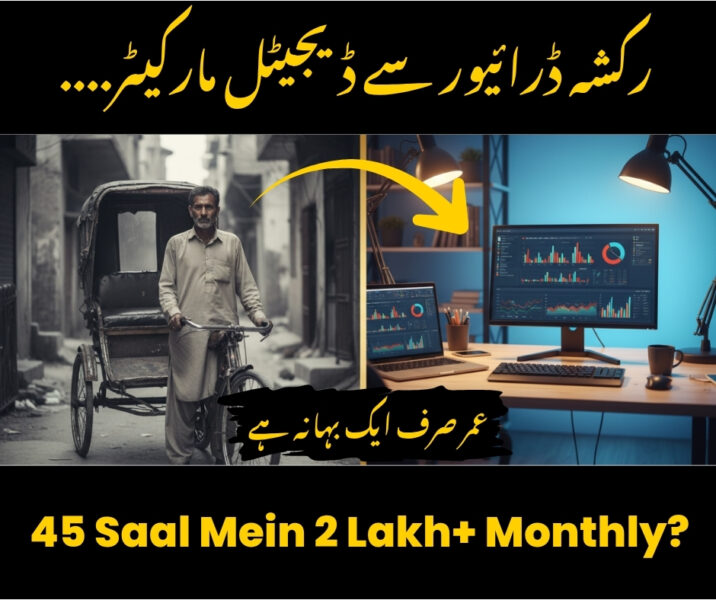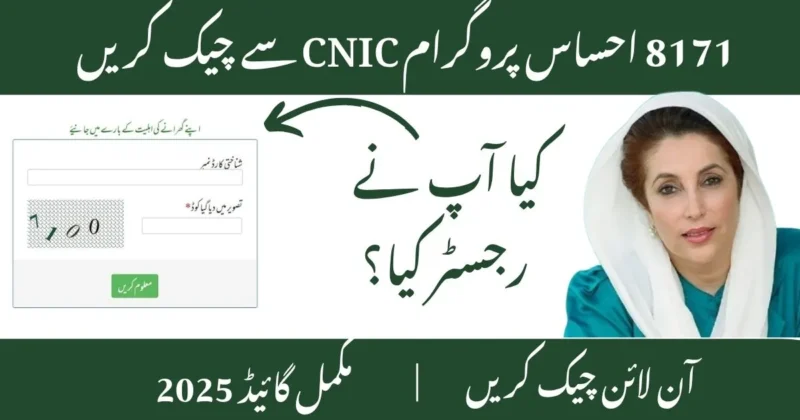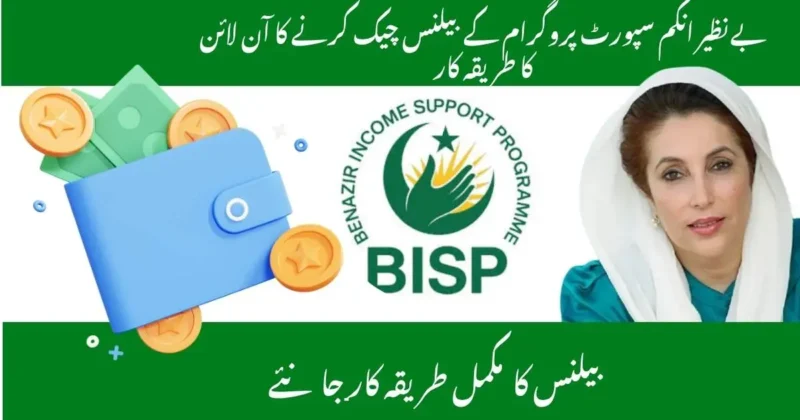8171 PMT Score Check by CNIC | Check it Now
The 8171 PMT Score Check by CNIC is Pakistan’s official digital verification system managed by NADRA (National Database and Registration Authority) and the National Socio-Economic Registry (NSER) that determines your household’s eligibility for the Ehsaas Program, Benazir Income Support Programme (BISP), and Benazir Kafalat Program. If you’re wondering whether you qualify for quarterly cash assistance ranging from Rs. 10,500 to Rs. 25,000 or monthly financial support, this comprehensive step-by-step guide will walk you through everything you need to know about checking your Proxy Means Test (PMT) score using your 13-digit Computerized National Identity Card (CNIC) number.
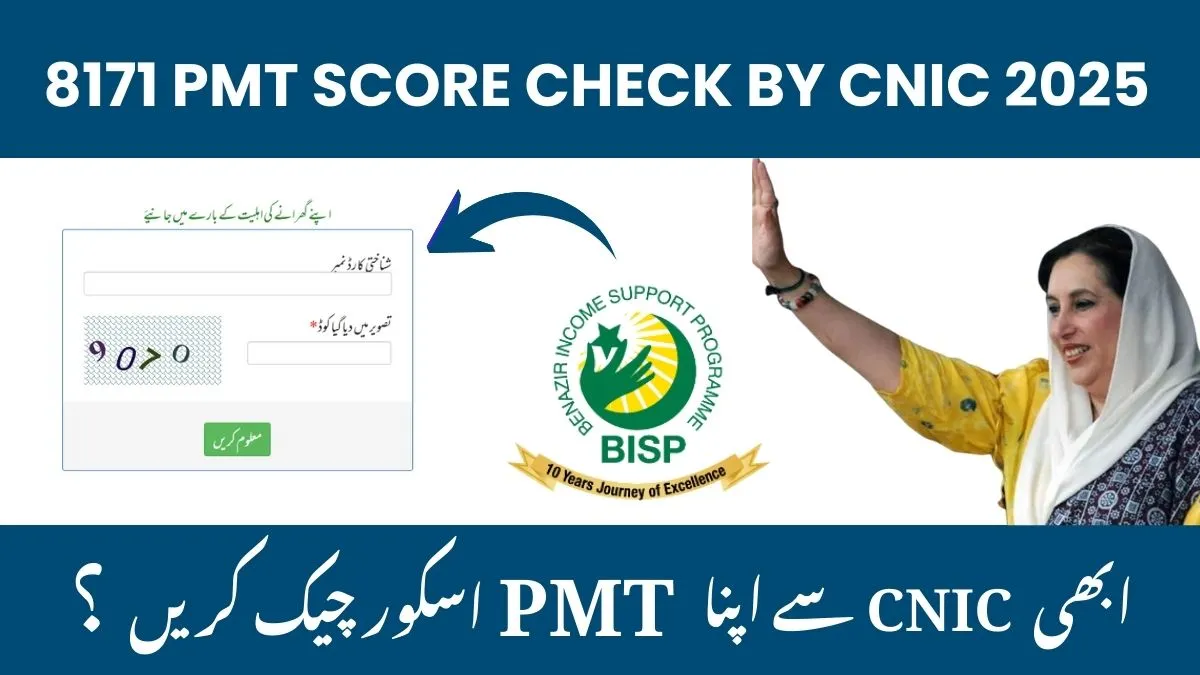
بی آئی ایس پی 8171 رجسٹریشن فارم
اپنی معلومات درج کریں اور اہلیت چیک کریں
The 8171 web portal (accessible at 8171.bisp.gov.pk and 8171.pass.gov.pk) has become the primary digital gateway for millions of low-income Pakistani families seeking government welfare support through the Ehsaas Kafalat Program, Benazir Taleemi Wazaif education stipends, Ehsaas Rashan Riayat grocery subsidies, and Ehsaas Emergency Cash assistance. By simply entering your CNIC number without dashes or spaces, you can instantly verify your PMT poverty score, check your current eligibility status, understand your BISP balance for pending installments, and confirm whether you’re qualified to receive quarterly payments of Rs. 13,500 from the Government of Pakistan under the Digital Pakistan Vision 2025 initiative.
The PMT scoring algorithm evaluates your household’s socioeconomic indicators including family income, asset ownership (property, land, vehicles), household expenditures, lifestyle factors, and dependent count (children, elderly members, disabled individuals) collected during the NSER survey conducted by government field teams. Families scoring 32 or below on the 0-100 PMT scale qualify for most BISP welfare schemes, while scores above the cutoff threshold result in disqualification—even if financial circumstances are genuinely difficult. This is why regularly monitoring your 8171 CNIC check status through the official portal, SMS service (by sending your CNIC to 8171), or the BISP mobile app is crucial to avoid payment disruptions, missed quarterly installments, or unexpected eligibility cancellations due to outdated NADRA records or NSER data.
Why PMT Score matters ?
When you check your 8171 PMT score using your CNIC, you’re essentially looking at a number that determines whether your household will receive financial aid from government programs or not. The Proxy Means Test score is incredibly important because it indicates the level of poverty within your family, and this single figure decides your eligibility for assistance. A lower score means you have a greater chance of qualifying for support, as it shows those who are most in need of help, while a higher score suggests less or even no eligibility for the amount of aid available. This system isn’t just about handing out resources—it aims to reduce fraud and corruption by ensuring that the distribution of assistance reaches the right people. What makes it truly valuable is how it provides transparency and fairness, so families genuinely struggling aren’t left behind while resources go where they’re actually needed most.
Your PMT score breakdown directly shows which poverty levels category you fall into for BISP eligibility. The system used by the Benazir Income Support Programme in Pakistan works straightforward: if your score is 32 or below, you qualify—this cutoff was approved by the BISP Board. Here’s how your full score gets calculated through a range of socioeconomic indicators during the detailed survey. The key factors include your household income and monthly income, which determine your financial standing. Your family size matters—the number of family members, dependents, and everyone who lives in your household affects the calculation. The survey examines your assets like ownership of land, a car, or livestock. Your housing situation is checked too—whether you live in an owned, rented, or kutcha house type. Finally, your expenses are reviewed, including daily needs and monthly expenses like utilities. All these factors combined create your score, though the complete scoring system isn’t publicly detailed. The conditions of your household across these categories help categorize families into different poverty levels, and this breakdown decides which programs you can access.
Score Categories:
- 0-32: Eligible for BISP assistance
- Above 32: Not currently eligible
What’s Measured:
- Monthly income and total household income
- Family size with number of family members and dependents
- Assets: Ownership of land, car, livestock
- Housing: Owned, rented, or kutcha house type
Expenses: Daily and monthly expenses including utilities
How to Check 8171 PMT Score by CNIC Online
When I helped my neighbor check her BISP eligibility through the 8171 system, I realized how important it is to understand the PMT score verification process. Here’s what I learned:
Method 1: Check Through Official Web Portal
- Visit the official website: 8171.bisp.gov.pk
- Enter your 13-digit CNIC number in the given field.
- Complete the captcha code shown on your screen.
- Click the “Submit” button to view your eligibility and status in detail.
💡 This method provides the most complete and detailed eligibility information.
Method 2: Check Through SMS
- Open your mobile messaging app.
- Type your 13-digit CNIC number (without dashes).
- Send it to 8171.
- You’ll receive an SMS reply showing your eligibility and payment status.
Understanding Your PMT Score Result
Your PMT score directly determines your eligibility for the Benazir Income Support Programme (BISP), and here’s what you need to know: a lower score generally indicates you qualify, with specific thresholds set at 34 or below as the common eligibility marker. If you have a very low score of 16.17 or under, you’re almost certainly eligible for support. However, a higher score – often above 13,500 – typically signifies ineligibility for most programs. Keep in mind that different criteria apply depending on the specific program and your region, so the threshold varies – for example, the CM Punjab Minority Card accepts scores of 45 or less, showing how requirements differ across assistance initiatives.
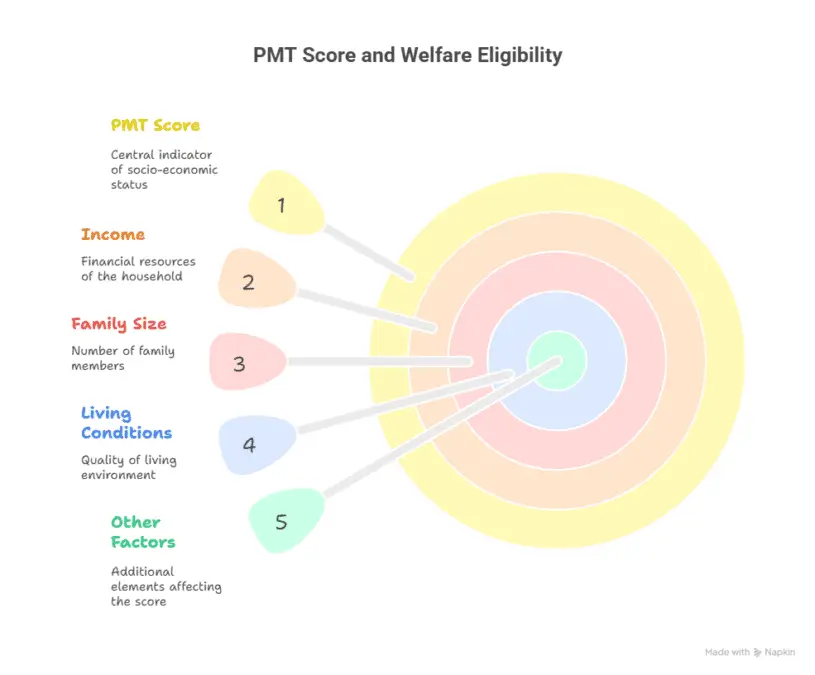
How to Improve or Appeal Your PMT Score
If your PMT score appears unusually high or inaccurate, you can request a correction through an official re-evaluation process. Start by visiting your nearest BISP Tehsil office, where trained staff can guide you on how to correct your NSER data and update your household details. During this process, make sure to bring your CNIC, family details, and utility bills as proof of your financial situation. These documents help authorities conduct proper eligibility verification under the Benazir Income Support Programme (BISP).
To improve your chances, ensure that your NADRA records are accurate. Your marital status, children’s information, and address must be up to date in the NADRA database. Any outdated or incorrect information can lead to a high PMT score, which may affect your program eligibility. Regular database updates at a local office help maintain data accuracy and ensure fair evaluation for low-income households in Pakistan.
If your financial or personal details have changed, request a new survey or dynamic NSER update. This re-survey checks your household information and performs a detailed income assessment. The verification process helps verify your personal information, confirms your identity verification, and compares your data within the national registry and NADRA update systems.
If you still believe your PMT evaluation is unfair, you can file a complaint at the BISP help desk or through the 8171 portal. Explain the issue clearly and attach supporting documentation or supporting documents for review. In most cases, a manual review or application correction can be initiated, and a review request will be processed through official channels. This ensures that your financial data, poverty score, and official record reflect your true circumstances.
The recheck process may also include steps like data correction, registry update, or error correction within the national database. Every applicant detail is cross-verified with government records to maintain transparency in assistance verification. Keep your updated data ready and follow up with the BISP verification team if necessary. Once approved, your score improvement will appear in the 8171 system, allowing you to track progress and confirm your eligibility review status.
To summarize the steps clearly:
- Visit your Tehsil office or local office under BISP.
- Provide your CNIC, utility bills, and family details for the verification process.
- Correct any errors in NADRA records or NSER survey data.
- File a complaint or score appeal if your PMT score remains incorrect.
- Wait for official record updates through the BISP help desk or 8171 portal.
This system ensures fairness and transparency for all beneficiaries, helping genuine low-income households receive the support they deserve through the Benazir Income Support Programme.d accountable manner.
When Should You Recheck Your PMT Score?
You may need to recheck your PMT score through the 8171 system if your household situation has significantly changed or if you were previously informed about missing important details in your record. Sometimes, beneficiaries missed the survey deadline or didn’t complete the necessary survey, which leads to delays in payments or incomplete status updates. It’s important to stay alert and recheck your record whenever such issues occur to ensure your information remains valid and up-to-date.
If your household’s income, number of dependents, or other qualifying factors have changed, rechecking becomes necessary. Your file may need to be re-evaluated to reflect your new situation, especially when there are significant updates like changes in earnings, employment, or family structure. This ensures your eligibility and payment cycle remain confirmed under the official system.
You should also consider a re-verification if your CNIC is not linked correctly or your NADRA data hasn’t been updated periodically. Make sure all your information in NADRA and NSER survey records is accurate and verified. Providing updated household information helps in avoiding delayed payments and keeps your status active in the system.
Those awaiting their initial status or whose application is still being reviewed after completing required steps should also check their profile through the 8171 platform. Doing this can help determine if there’s a delay in the process or if any additional review is pending. In most cases, rechecking after the completion of all required surveys ensures that your eligibility remains valid and accurately recorded in the national system.
If your information was recently updated, or if you submitted a re-verification request, you should recheck your PMT record to provide confirmation and check updated eligibility. Staying proactive and verifying your details after completion of every update process helps maintain a smooth payment flow and prevents delayed disbursements.
Recommended Reading
Conclusion
The 8171 PMT Score Check by CNIC is the government’s most reliable system to verify eligibility for financial aid under the Benazir Income Support Programme (BISP) and related Ehsaas initiatives. Your PMT score calculated from NSER survey and NADRA records directly decides whether your household qualifies for support. To stay eligible, keep your data updated, recheck after major life or income changes, and use the 8171 portal or SMS service for timely verification. Staying proactive ensures you receive your rightful assistance without delays or disqualification.









